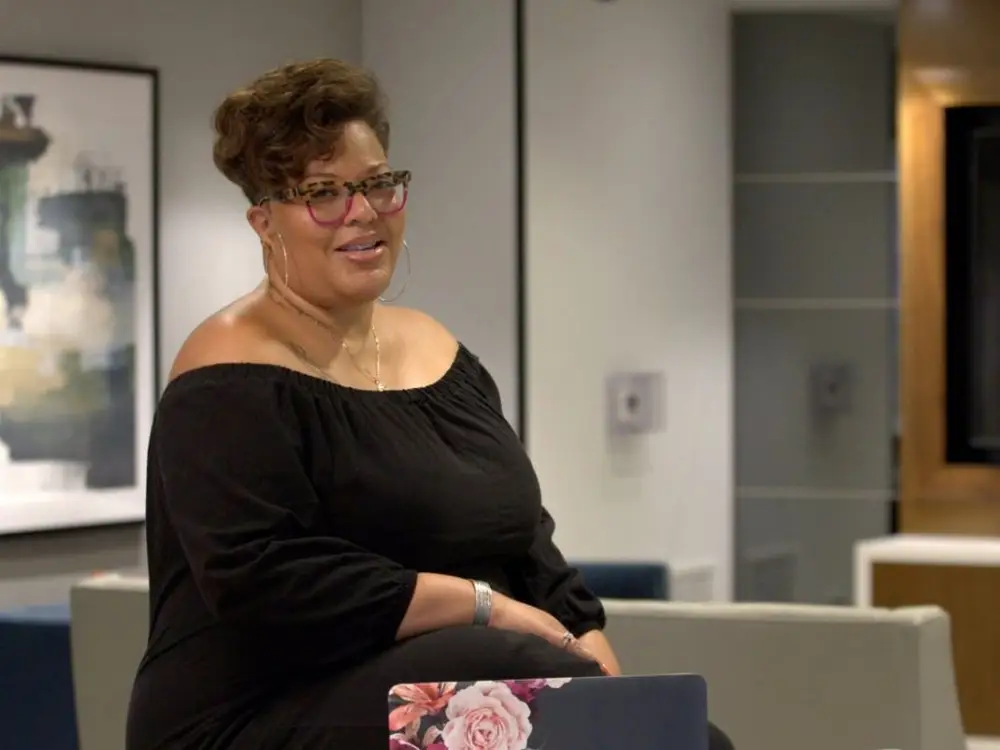I love being a middle manager. Amazon’s decision to cut middle managers saddens me — this role is misunderstood.

Michelle Busch is a middle manager at a PR firm.
After working in hospitality management and at a small criminal justice government agency, social media took off, and I began to delve into communications.
A former member of my church had a PR firm and brought me on board in 2016. They taught me the ins and outs of the business, like what makes a good story and how to pitch an idea.
In 2019, I decided to start my own PR firm. I worked with musicians, nonprofits, and sports teams and had a great experience, but after the pandemic, I decided to take a break. Many businesses cut costs, and contracts were often the first things they looked to cut to reduce their overhead.
Since June 2023, I’ve been chief of staff for TJM & Co. Media Boutique in Brooklyn, New York. I love being a middle manager.
I landed my current role in PR middle management through a Facebook mentoring group
The CEO, Tiffany Joy Murchison, led a session I joined and asked the class what we wanted to discuss. That call lasted four hours. After a few more sessions, she contacted me and asked what I was working on. I said I was seeking employment because I needed to put my business on hold.
I felt confident going into a role for another small-business owner. I always knew I wanted to collaborate with more PR professionals.
In middle management, there’s an adjustment phase where you adapt to established procedures. For example, when I managed my business, I would email clients as needed throughout the day, often responding shortly after they contacted me.
I had to learn that balancing proactive and reactive behavior is crucial when working within a team. You have to anticipate client needs and respond to immediate concerns while efficiently managing the team and multiple clients.
I have two direct reports, and I report directly to the CEO
My direct reports are our PR strategist, digital PR coordinator, and interns. I oversee the client accounts in general, review our progress with each client, manage upcoming tasks, support client meetings, and handle scheduling and billing management.
Managing down starts with being a good listener, providing support, and communicating clearly and consistently to set expectations and provide guidance.
Managing up involves understanding the company’s vision, thinking strategically, and communicating clearly. Balancing both requires setting priorities and being adaptable.
My day-to-day is never the same
We work virtually, but sometimes I’m in New York, and sometimes the CEO is in DC with me. Most mornings, I get the team together, and we speak through issues arising for our clients and the work we must do for the day. In PR, things can come up suddenly.
If a client has a crisis, we often have to stop what we’re doing and re-prioritize our plans for the day depending on how much attention it requires.
We’ll get together as a team and identify the crisis by reviewing all communication from the client or sources and then listening to the client’s request. This approach helps us maintain control over the narrative, which is very important.
The idea that middle management roles are expendable is crazy
Middle managers have a critically important role, and the notion that our roles are expendable in a particular climate overlooks the strategic importance of what we do.
I think many middle managers feel undervalued because it’s not a lane many want to be in. Sometimes, you’re working on tasks that aren’t supposed to be your responsibility anymore but are still under your oversight, or you should be focusing on leadership-level tasks but can’t. Balance is critical in this role.
Without middle managers, you lose operational management. Amazon’s recent announcement that they’re cutting down on middle managers saddens me. It puts more work on team members who are already carrying heavy loads. Middle managers are crucial in bridging communication between executives and staff, ensuring operations run smoothly.
The most important skill you need as a middle manager is listening
The phrase that pays is you have to listen to understand. In the communications industry, we’re always speaking, but many of us need to learn that listening is sometimes more important.
One day, I imagine I’ll return to running my own agency, but I want to do it when I’m ready. I’m enjoying learning more about the operational side of things for now.






